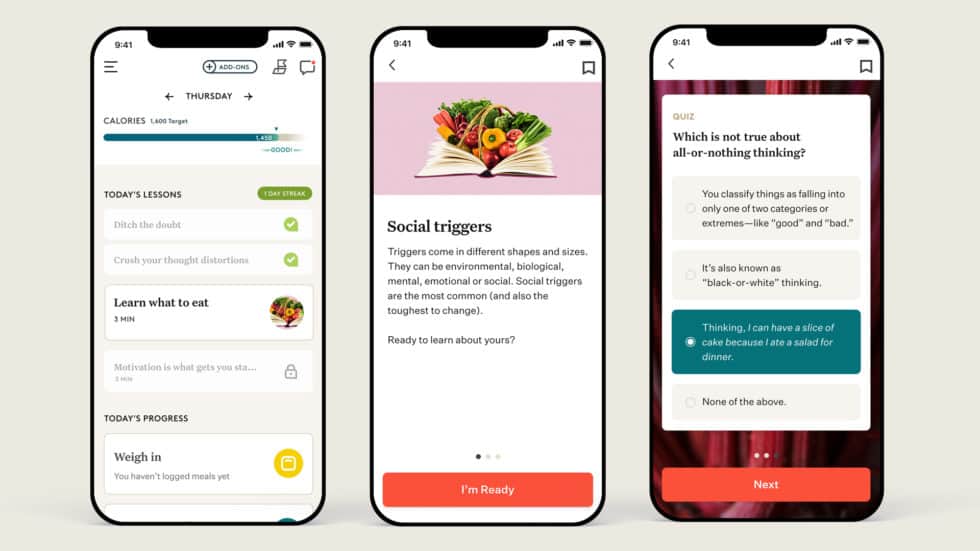How to lose weight during menopause (+FAQs about menopause weight gain)

- Menopause can make losing weight more difficult. In fact, the average person gains two to five pounds during the menopause transition.
- Tracking your food intake, maintaining a calorie deficit, and addressing the emotional aspects of eating may help you lose weight during menopause.
- Noom’s customizable program helps women in perimenopause or menopause overcome their unique weight loss challenges.
Menopause can be a confusing and challenging time, to say the least.
On top of mood swings, sleep disturbances, and all of the other uncertainties that come at this stage of life, your weight loss may stall—or you may even gain a few pounds.
It’s not in your head.
Let’s talk about why menopause weight gain happens, what you can do about it, and how to lose weight during menopause.
Ready to make a lasting change?
A healthier you, wherever you are.
FAQs around menopause and weight gain
Does menopause cause weight gain?
Weight gain during menopause is real and common.
Studies show that the average weight gain during menopause is between two and five pounds, while the reduction in estrogen can lead to an increase in body fat percentage.
You might also notice the shape of your body changing as fat starts to accumulate around your midsection instead of your hips and thighs.
Along with this “menopause belly,” the hormonal changes of menopause also bring an increased risk of heart disease, osteoperosis, and type 2 diabetes.
Why do people gain weight during menopause?
During menopause, progesterone decreases, and estrogen levels can fluctuate wildly.
These fluctuations are what cause many of the symptoms we associate with menopause (hello, hot flashes) and—paired with the stressors of middle age—can make menopause weight gain more likely.
Sleep disturbances
Sleep disorders are one of the main symptoms of menopause and can wreak havoc on your quality of life.
On top of having your sleep disrupted by hot flashes (or night sweats), people experiencing menopause are also at an increased risk of insomnia and sleep apnea.
These problems often begin during perimenopause (the years leading up to menopause) and, unfortunately, can continue post-menopause.
Lack of quality sleep can leave you feeling foggy, fatigued, and irritable.
So already, you’re not thinking straight, grabbing doughnuts in a zombie-like haze while walking through the office—and studies suggest that lack of sleep can actually increase your appetite and cravings.
Slower metabolism
As we reach midlife, other changes happening within our bodies can also contribute to weight gain.
For example, people start losing 3-8% of their muscle mass per decade starting around 30—and at an even faster rate after the age of 60.
As you lose muscle mass, your metabolic rate (how fast your body burns calories) slows down, which can make losing weight more difficult.
Stress
Menopause and its symptoms are a source of stress on their own.
It doesn’t help that “the change” coincides with middle age when you might be caring for your elderly parents or sending your own children off into the world—other potential sources of stress.
During these times, it can be more challenging to maintain a healthy diet as we seek comfort in food—especially since studies suggest that higher levels of the stress hormone Cortisol can increase your appetite.
Menopause symptoms usually resolve once your body adjusts, but it’s not necessarily smooth sailing from there.
Studies show that postmenopausal women (in their 50s and 60s) continue to gain 1.5 pounds each year on average.
It might feel like weight gain during and after menopause is inevitable.
But there are effective tactics for heading off (and losing) those excess pounds—even in middle age.
Ready to make a lasting change?
A healthier you, wherever you are.
How to lose weight during menopause
Some weight loss tips are unique to being middle-aged, like increasing resistance training since you’re losing muscle mass.
But for the most part, menopause weight loss doesn’t require a special playbook.
To lose weight during menopause, you’ll use plenty of common weight loss tactics—like maintaining a calorie deficit and exercising.
The trick is being extra diligent to counterbalance your naturally slowing metabolism.
Focusing on the following areas can help you do it in a healthy and sustainable way.
Note: Consult with your medical provider before making any dietary changes.
Address the emotional side of eating
Menopause is a time of physical and emotional upheaval. And while you may not be able to control the hormonal changes in your body, you can control your behavior—and that starts with awareness.
Some days, you might just need some ice cream directly out of the carton. And that’s okay.
But it’s not something you’ll want to do every day.
Understanding why you eat what you eat is the first step toward lasting weight loss.
When you can identify your unhealthy behaviors—and their triggers—you can start establishing more positive habits that will push you toward your weight loss goals rather than sabotage them.
For example, say you’re stressed about a big meeting with a client—a situation that would usually have you munching mindlessly on corn chips. By recognizing the trigger (stress), you can head off that unhealthy behavior.
Instead of bringing the bag of chips to your desk, you might allow yourself a small handful and take the rest of that nervous energy for a walk around the block.
Small, sustainable lifestyle changes—like eating a handful of chips instead of an entire bag—make a big difference over time.
Maintain a calorie deficit
There’s no getting around it: losing weight requires being in a calorie deficit (burning more calories than you consume).
But you don’t have to swear off carbohydrates or sweets (or anything else) to do it.
In fact, restrictive diets that leave you feeling hungry or deprived aren’t a sustainable way to reach a healthy weight. (Seriously, does anything make you want to binge on French fries more than knowing you can’t have any?)
And when you reintroduce carbs or go back to eating normally, you’re likely to end up right where you started—having deprived yourself for no reason.
A food tracker app (like Noom’s) can help you lose weight in a healthy, sustainable way.
In fact, studies suggest that tracking your food intake actually aids with weight loss.
When you log everything you eat, a few things will happen:
- You’ll see how many calories you actually consume.
- You’ll learn which foods you can fill up on for the fewest calories and which ones to enjoy in moderation.
- You’ll start to recognize what a proper portion size looks like.
Meal tracking helps you stay accountable and, over time, learn which foods have a low caloric density and eat more of those—so you can splurge on ice cream now and then without derailing your progress.
Exercise
Exercise isn’t necessary for weight loss (yep, you read that right). But it can help you reach a calorie deficit a little bit faster.
It’s also a healthy habit with lots of benefits (both mental and physical) for people going through menopause.
Physical activity is a good way to blow off steam after a rough day, whether it’s cardio or strength training. It’s also great for maintaining muscle mass, improving blood pressure, and strengthening bones.
If the idea of working out at a public gym sends shivers down your spine, that’s okay. Find an activity you enjoy so you’re more likely to stick with it, whether that’s walking with a friend, swimming, practicing yoga, dancing, or playing pickleball.
Whatever you choose, talk to your doctor about it—and start slow so you don’t burn out or, worse, injure yourself.
Get more sleep
Not being able to fall asleep—or sleep for several hours uninterrupted—is beyond frustrating. Unfortunately, for people going through menopause, it’s also common.
But there are things you can do to create an environment that is more conducive to getting enough sleep:
- Keep your bedroom cool, dark, and quiet.
- Try to go to sleep and wake up around the same time each day.
- Develop a bedtime routine (take a warm bath, write in a journal, or read a book).
- Try not to watch TV or look at the computer in the hour before bed.
- Exercise regularly (just not right before bedtime).
- Don’t overindulge in alcohol.
- Limit your caffeine intake—especially later in the day.
Our next tip deserves a paragraph of its own—don’t stress about sleep!
Yeah, we know we just told you that sleep is important, but stressing too much about rest often makes it difficult to do just that.
So go easy on yourself. There may be nights when sleep eludes you, even if you’ve done everything “right”—and that’s okay!
Part of the menopause journey is accepting that some things just aren’t going to go your way—and you just do the best you can.
Lose weight during or after menopause with Noom
At Noom Weight, we believe that long-term weight loss happens when you address both the physical and emotional aspects of eating—whatever stage of life you’re in.
That’s why Noom includes daily lessons that are based on psychology. These short, digestible lessons help you recognize the triggers that cause you to overeat and conquer the thought distortions (like “I’ll never lose this belly fat”) that make you want to give up.

With Noom, you’ll eat what you want when you want (nothing is off-limits, really!) and learn how to make healthy choices that keep you satisfied while maintaining a calorie deficit.
When you log your meals in Noom’s food tracker, you’ll see that every item is categorized as green, yellow, or red.
Green foods have the lowest caloric density (like veggies and whole grains), red foods the highest (like chocolate and cheeseburgers), and yellow foods (like lean meats and healthy fats) fall in the middle.
We want you to enjoy them all, so you can lose weight without feeling deprived.
You can also log your exercise and sleep in the app.
And with Noom Weight, you’ll also have access to 1:1 coaching and a built-in community of fellow Noomers. Your coach can help you overcome the unique challenges of menopause and the unhelpful thoughts—like “I’ll never lose this weight”—that hold you back.
Are you ready to make lasting change? Learn more about how to use Noom for menopause here.

